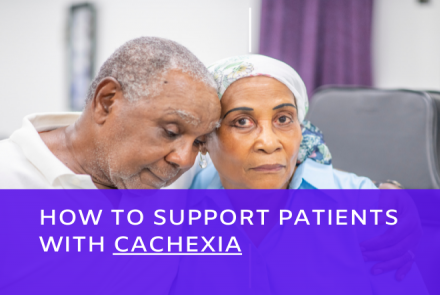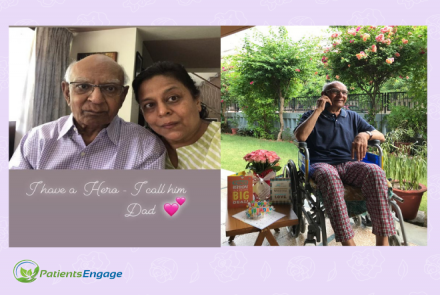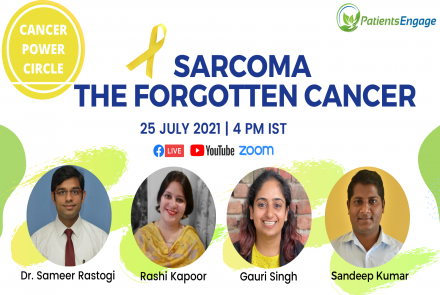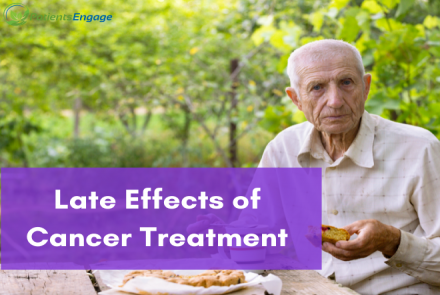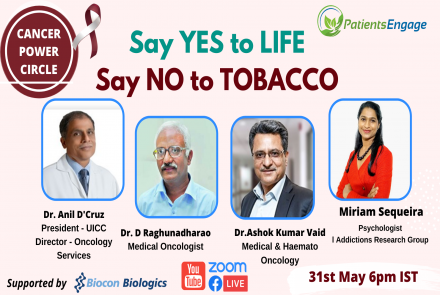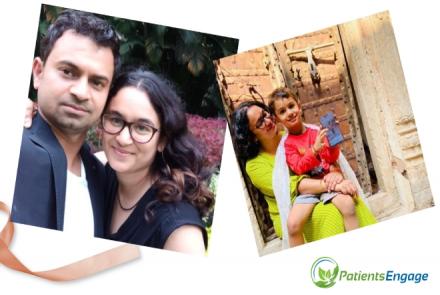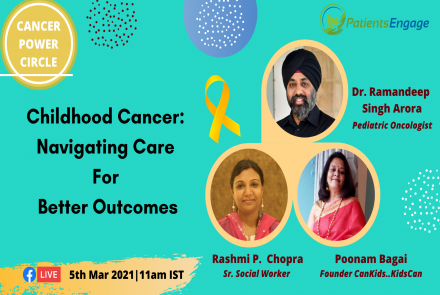
Ms.Bincy Mathew is a psycho-oncologist, currently working with HCMCT-Manipal Hospitals, New Delhi. She talks about the importance of counselling for cancer patients and their families who are dealing with their psycho-social issues.
What is the role of Psycho-oncology or psychosocial oncology in Cancer care?
It is not a myth that cancer brings a lot of emotional and psychological burden on patient’s and caregiver's lives. The fact is, most people are not prepared to face such unexpected situations and are in great distress when they do not know how to deal with it. Studies have reported that 45% to 60% of patients are found to have severe psychological distress after a cancer diagnosis. Without timely support and care, it can transform into anxiety or even depression, and neglecting these issues can adversely affect treatment results. This is where psycho-oncology comes in.
Psycho-oncology is a specialty field within oncology that supports patients and caregivers in overcoming their emotional and psychosocial issues during their cancer journey. It is especially relevant in countries like India, as there is a lot of cultural and social stigma associated with cancer. Some of the common issues among cancer patients include severe psychological distress due to financial crisis, body image issues, adjustment issues, and psycho-sexual issues which a lot of people in India would not even talk about. These issues can become very critical to a patient's recovery as it can cause delay in decision making about the treatment. In some cases, complete denial at time of diagnosis by family members can also result in serious delay in treatment.
Psycho-oncologists are trained to help them to identify the issues and resolve them as quickly as possible. It is a proven fact that these services can significantly improve resilience, adherence to the treatment and improve their overall wellbeing of the patient and their loved ones.
How can one recognize patients who need counseling? What are the signs to look out for.
Psycho-oncology interventions can start from the time when a person finds suspicious symptoms of cancer to survivorship or grief and bereavement period. Counseling plays a very important role at key events like revealing the cancer diagnosis and moving from one treatment intent to another. These are extremely delicate situations in the treatment journey but often overshadowed by the physical aspect of the disease.
From the time of diagnosis, patients experience a range of feelings such as constant worry, fear, sadness, anger, frustration, loss of control, etc. While these feelings are completely normal, if it is starting to affect their daily living and treatment, it is a sign that they must seek professional help. One must watch out if their sleep is disturbed, changes in appetite, loss of interest, preoccupied with worrying thoughts, etc. Even symptoms like palpitations, irritability, unable to concentrate, tension are not to be ignored.
Is psycho-oncology useful for all age groups? Especially the elderly?
Emotional health applies to every individual regardless of their age, gender or background. Psycho-oncologists are trained to understand the unique needs of cancer patients. We identify their strengths and weaknesses by looking at their personality, core values and belief systems; these are important aspects to take into consideration and help them to cope up with the situation in much better ways.
Each cancer patient goes through different degrees of unpleasant emotional experiences and challenges. The approaches we use in counseling a child may vary from the approaches we take for an adult as the challenges might be different, but I do not see any particular limitations in the services or its usefulness depending on their age.
Many patients put on a brave façade, how can care providers help them?
Yes, many patients and caregivers do that in their treatment journey. Especially when they are in denial about the whole situation, they will be least willing for counseling. In such a situation we start with an informal conversation and assure them that we are there for them if needed.
We also do not expect people to start sharing everything in the first session. We need to build rapport with the patients and create a reciprocal relationship. With some, it may happen quickly, with others it may take more time but then we keep trying patiently, sooner or later we gain their trust.
As care providers, we need to be extra patient and flexible with patients with cancer. Sometimes we need to stop sessions midway on their request. We need to be mindful of their physical and mental conditions, and be flexible with our approach.
What are the common myths surrounding psycho-oncology?
I do not think there are myths, particularly about psycho-oncology as it is not yet very popular in our country. But the social stigma, taboos, myths and misconceptions associated with mental health is applicable here as well. And to add oil to the fire, we have to fight the taboos, myths, and misconceptions about cancer as well.
To give an example, I have heard people without cancer telling cancer patients to stay positive to heal faster but there is no study supporting such claims. On the contrary, it gives the patient an additional burden to force themselves to be positive if they naturally cannot. We need to listen to them and be more empathetic rather than add burden to a patient’s already tough situation.
What are some of the cultural challenges you face?
In India, a lot of people have serious problems with the word ‘psych’. When I introduce myself as ‘psycho-oncologist’, or a ‘psychologist’ I can often sense the friction in patients. There are even instances where people would ask me to leave and it’s surprising when it comes from rather educated people. It is a sign that as a society we still haven’t progressed enough to consider ‘psychology’ as normal as ‘gastroenterology’ or ‘gynaecology’ in health care. Unfortunately, the majority of us have been brought up to perceive mental illness as something abnormal and crazy, while other physical illness is normal. But when it comes to cancer, one of the biggest cultural challenges in India today is the attitude people keep about having been diagnosed with cancer. On one hand, some patients would hide the disease even from their family members, on the other hand, there are family members who keep the diagnosis and prognosis a secret from the patient itself. Imagine when we have to meet such patients on a daily basis and yet cannot really utter a word about cancer.
Speaking about cultural challenges, recently a case of a female patient was referred to me who was very adamant about not taking chemotherapy. The entire team was worried and was not able to understand the reason. I sat with the woman and tried to understand where her fear was coming from. It turned out to be her fear of losing her husband. As strange as it may sound, this is a true story. She knew about the hair loss with chemotherapy, and her husband adored her hair so much that it worried her that he would leave her if she lost her hair. This was causing her a lot of anxiety to pursue the treatment. This is one of the many cases in women with cancer and the cultural and social challenges they go through.
In what ways is psycho-oncology counseling useful during the final days of life?
‘End of life care’ is probably a less explored area in general. Psycho-oncology in general aims at easing patient’s treatment journey and provides them with the right awareness into the situation to act accordingly in all stages. If the patient is aware of their prognosis it is easy for the health care professionals to help them especially during the final days of their lives. We try to understand their wishes, their concerns, and needs. Sometimes we also act as mediators with the family members and help them to meet their wishes. These can be psychological, social and spiritual needs. Sometimes we need to provide affirmation and give reassurance to improve their quality of life, but that does not mean we are giving them false hope.
We discuss with the patient about what is happening to their bodies, about the meaning of their illness, their relationships, wills, explore their possible fears, their hopes and their spirituality. This provides them with opportunities for a holistic preparation for living with the illness in the present, for the process of dying and death itself.
How can one handle the fear of possible death due to one’s illness?
The association of the word ‘death’ with cancer is a deep-rooted one in many cultures. Naturally, the news shakes them and it takes time to sync in. Many modern cancer facilities are aware of these situations and they have specialists like us to break the news to the patients so that we can help them to cope with the situation in a better way.
We try to understand their source of support which makes them calm and comfortable. Using that knowledge we try to get more confidence, strength in them to ease the situation. Their fear is real and we convince them it is normal to feel that way in the first place, and then we assure them that with time it reduces as well. However if it is affecting their daily lives and treatment, they should inform their physician. The best way to deal with it is by telling the therapist about their worries and fears. With time, patients are encouraged to find more meaning in their lives aiding in overcoming their fears sooner so that they can focus on their treatment.
Since survival rates of patients vary, how do you deal with patients who suffer from survivor’s guilt?
Yes, that is absolutely right! Advancement in cancer treatment, today we have a lot more survivors among us. Like any other adverse situation in a person’s life, cancer also changes and transforms people as they come out of the disease. Many celebrities have become crusaders in the fight against cancer, to create awareness about the disease and save lives.
Often the fight against cancer can become much more than just about the patient, people come together and make new relationships during this time. One of the common issues is the special bond patients develop with other patients like them who are suffering from similar illnesses. This becomes very strong, the survivors feel guilty when their fellow cancer patients do not make it and grief of losing their new friend causes tremendous trauma to them.
There are many forms of guilt experienced by survivors; some people feel they are a burden to their family. They feel guilty about disrupting their loved one's routines and resort to self-blaming when they come back to their lives after cancer. These are very delicate situations, we need to make them recognize these emotions and move forward. Through our sessions, we prepare them to face these feelings of guilt that come and go and eventually disappear. The important thing here is, as a society, we need to be more open about psychological health and bring it to be more mainstream so that more and more people can come out and seek help without feeling ashamed about it.
Ms.Bincy Mathew has been working with cancer patients for the past seven years dealing with their psycho-social issues. Her major area of interest is in palliative care for cancer patients. She is also very active in creating awareness about psychological aspects of cancer care, cancer prevention and tobacco control through her social media handles and blog.


